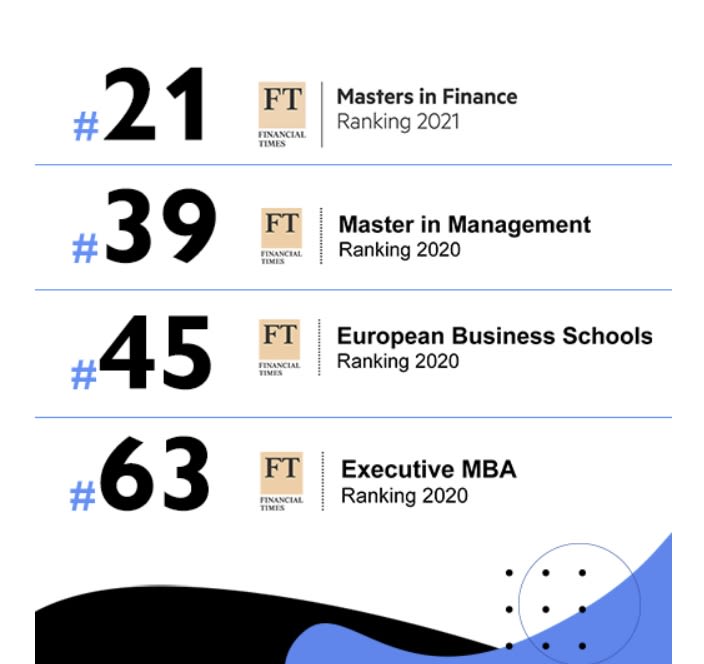
Bachelor in Management - Management and Artificial Intelligence
Kozminski University

Key Information
Campus location
Warsaw, Poland
Languages
English
Study format
Distance Learning, On-Campus
Duration
3 years
Pace
Full time
Tuition fees
EUR 5,520 / per year **
Application deadline
Request info *
Earliest start date
Request info
* we recommend Non-EU candidates to apply as soon as possible due to visa issues
** 1st year tuition
Introduction
- The Management and Artificial Intelligence Program are a major in the Bachelor in Management Program.
- The Program is a rare, but very necessary, combination of insightful management knowledge with programming skills and data analytics.
- The studies are aimed at educating more and more managers demanded on the labor market, who simultaneously have:
- Business skills
- Knowledge of new technologies and their impact on society
- Knowledge of quantitative and qualitative research methods
- Programming competences (programming in several languages - Python, Java)
- In addition, students will master the tools for multidimensional analysis of the digitalization processes and will acquire the skills necessary to identify, acquire, store, and analyze data of a large volume (Big Data).
- Students have the opportunity to familiarize themselves with theories that give a deeper understanding of the ongoing technological revolution and the related social and business changes.
- During the studies a module on artificial intelligence is implemented, thanks to which students acquire skills in the field of programming and machine learning as well as their use in business.
- From the second semester, students will work in groups on a start-up or implementation project under the supervision of KU specialists.
- During their studies, students obtain a certificate which states that they completed a Python programming course, and a certificate of obtaining a basic course in machine learning.
- The Program offers a lot of freedom in developing the students' interests by offering elective courses aimed at deepening their interests.
- Graduates receive a Bachelor in Management diploma. Additionally, they get a diploma's supplement stating that the graduate has finished a major in Management and Artificial Intelligence in Digital Society.
- The studies are run only in full-time mode.
Substantive Partner of the Program:

Admissions
Curriculum
Courses
Selected Courses
- Principles of Management
- Principles of Law
- Quantitative Methods
- Principles of Psychology
- Critical Thinking
- Report and Dissertation Development
- Principles of Finance
- HR Management
- Project Management
- Digital Marketing
- Strategic Management in New Economy: Business Models
- Qualitative Research
- Introduction to Management in E-Economy
- Introduction to Innovation Management
- Introduction to Digital Society
- Introduction to KPI
- Basic Scrum
- Introduction to Knowledge Management
- Foresight
- Idea Lab
- Computer Science
- Ethics in Business
Major Courses
- Introduction to Online Analysis
- Big Data and Algorithms
- Introduction to Python and Machine Learning
- FinTech
- Crowdfunding
- Advanced Python
- Legal Aspects of E-Economy
- Cloud Infrastructures and Other Business IT Tools
- Advanced Machine Learning
- Science and Technology Studies
- Introduction to Business E-Security
- Data Mining
- Social Networks Analysis with the Use of API
- MDA (Multidimensional Data Analysis)
- Methods of Data Visualization
Elective Courses
- Coolhunting and Coolfarming with the Use of Condor
- Platforms, Crowds and the Sharing Economy
- Open Collaboration, Virtual Communities, and Hacker Cultures
- Virtual Ethnography
- New Product Development
- New Ventures Financing and Sales Pitching
- Startup Incubation Process
- Managing a Team in the High-Tech Industry
- Customer/User Experience
Class Schedule
- Full-time programs
Classes take place from Monday to Friday in the morning and in the afternoon.
Rankings
- Best business school in Central and Eastern Europe according to the Financial Times ranking – ranked 48th in Europe
- Best economic higher education institution in Poland according to the Perspektywy ranking
- Best non-public higher education institution for 21 years according to the Perspektywy ranking

Gallery
Rankings
Rankings
- Best business school in Central and Eastern Europe according to the Financial Times ranking – ranked 48th in Europe
- Best economic higher education institution in Poland according to the Perspektywy ranking
- Best non-public higher education institution for 21 years according to the Perspektywy ranking

Program Outcome
What you gain from your studies
- Theories in the field of management.
- Artificial intelligence and machine learning.
- Project management.
- Innovations in the field of finance (fintech).
- Modern theories on innovation management.
- Big Data analysis.
- Business models developed in the digital economy.
- Basics of programming in selected languages.
- Basics of marketing in new media.
- Use of theory to analyze problems concerning technology management and the role of technology in modern society.
- Application of machine learning techniques.
- Data visualization.
- Applying strategic planning techniques to the problems of a given organization.
Scholarships and Funding
Scholarships for the best candidates
Candidates who have achieved at least 470 qualifying points have the possibility to apply for the "Scholarship for the Best Candidates".
The awarded candidates are chosen based on a ranking system.
Only applications submitted until the 15th of July will be considered for the scholarship. The candidates, who were granted a scholarship will be informed about it at the latest on July 31st.
Program Tuition Fee
Career Opportunities
Career opportunities after your studies
The studies provide knowledge and competencies enabling students to take up employment as a data analysis specialist. They also give valuable preparation for work in consulting (especially in IT consulting) and in corporations on managerial positions.
Typical organizations employing graduates are production and service enterprises, banks, insurance, and telecommunications companies, but also the public administration, as well as research centers for data analysis and organizations, focused on the digital economy: e-commerce, start-ups.